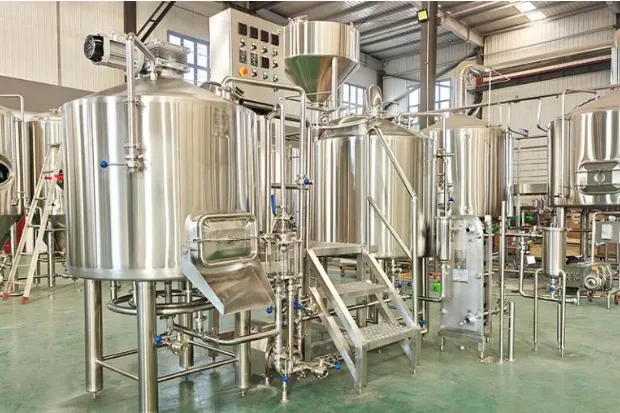Routine Maintenance Schedules for Brewery Equipment
Introduction
Behind every great pint of beer lies not only creativity and passion but also well-maintained equipment. Brewing equipment—whether it’s a mash tun, fermenter, or bottling line—works hard under high stress, high heat, and demanding cleaning cycles. Without a structured maintenance schedule, small issues can turn into costly breakdowns, contamination risks, and production delays.
Routine maintenance is not just about prolonging the lifespan of equipment—it is about ensuring consistent beer quality, protecting worker safety, and safeguarding the brewery’s investment. This article explores how breweries can implement routine maintenance schedules, outlining best practices by equipment type, suggested frequency, and the long-term benefits of disciplined upkeep.
Also Read: Breathe Better, Look Great: Benefits of Rhinoplasty in Dubai
The Importance of Routine Maintenance
Consistency in Beer Quality
Brewing requires precision. A clogged heat exchanger or an improperly calibrated sensor can lead to temperature variations that affect yeast health or hop utilization, resulting in inconsistent flavor.
Equipment Longevity
Brewing equipment is expensive, and unexpected replacements can cripple a brewery’s budget. Regular upkeep helps extend the lifespan of tanks, pumps, and piping.
Safety Compliance
Steam boilers, pressure-rated tanks, and electrical components all present safety risks if poorly maintained. Routine inspections reduce the likelihood of accidents and help meet regulatory standards.
Downtime Prevention
Unplanned breakdowns halt production and disrupt schedules. Preventive maintenance minimizes downtime by addressing wear and tear before it becomes critical.
Establishing a Maintenance Schedule
Daily Checks
- Inspect hoses and connections for leaks.
- Monitor temperature probes, gauges, and pressure readings.
- Perform CIP (clean-in-place) or manual cleaning after each batch.
- Visually inspect welds, seals, and gaskets for signs of wear.
Weekly Tasks
- Lubricate pumps, agitators, and moving parts.
- Clean and sanitize keg fillers, bottling lines, and canning equipment.
- Backflush heat exchangers to prevent fouling.
- Drain and check air compressors and glycol chillers for water buildup.
Monthly Routines
- Inspect and test safety valves on pressure vessels.
- Check glycol levels and replace if contaminated.
- Calibrate sensors, thermometers, and flow meters.
- Inspect CIP spray balls and replace clogged or damaged units.
Quarterly and Annual Maintenance
- Passivate stainless steel surfaces to restore corrosion resistance.
- Inspect and service steam boilers.
- Perform full tank inspections (interior and exterior).
- Service electrical systems and control panels.
- Replace worn seals, gaskets, and O-rings.
- Review maintenance logs to identify recurring issues.
Maintenance by Equipment Type
Brewhouse Vessels (Mash, Lauter, Kettle, Whirlpool)
- Daily: Rinse and perform CIP cycles after each brew. Check for residue buildup.
- Weekly: Inspect rakes, false bottoms, and heating elements.
- Monthly: Inspect weld seams, jackets, and agitators.
- Annually: Passivate vessel interiors and recalibrate heating systems.
Fermentation Tanks and Brite Tanks
- Daily: Monitor temperature probes and pressure gauges. Inspect gaskets and tri-clamp fittings.
- Weekly: Verify cooling jackets are functioning. Clean sample ports.
- Monthly: Inspect interior polish for scratches or pitting.
- Annually: Perform pressure testing, replace worn valves, and re-passivate surfaces.
Pumps and Motors
- Daily: Check for leaks, vibration, or unusual noise.
- Weekly: Lubricate bearings and clean filters.
- Monthly: Inspect seals and impellers.
- Annually: Overhaul pumps, replace worn seals and bearings.
Heat Exchangers
- Daily: Flush after each use.
- Weekly: Backflush to remove buildup.
- Monthly: Inspect gaskets and plates for wear.
- Annually: Disassemble for deep cleaning and inspect for corrosion.
Glycol Chillers and Cooling Systems
- Daily: Check glycol levels and system temperature.
- Weekly: Drain compressor tanks to remove moisture.
- Monthly: Inspect piping for leaks, test glycol concentration.
- Annually: Flush the entire system, replace glycol if needed, and inspect compressors.
Steam Boilers
- Daily: Monitor pressure and water levels.
- Weekly: Blow down to remove impurities.
- Monthly: Inspect safety valves, controls, and gauges.
- Annually: Full service by certified technicians.
Packaging Lines (Bottling, Canning, Kegging)
- Daily: Clean fillers, rinse lines, and check CO₂ purge systems.
- Weekly: Lubricate conveyors and inspect seals.
- Monthly: Calibrate fill heights, test oxygen pickup, and replace worn components.
- Annually: Perform a full overhaul and service labeling machines, seamers, and sensors.
Documentation and Tracking
Maintenance Logs
Breweries should maintain detailed logs that record:
- Date of maintenance.
- Task performed.
- Observations (wear, leaks, calibration issues).
- Parts replaced.
- Next scheduled maintenance.
Digital Maintenance Systems
Some breweries use digital CMMS (Computerized Maintenance Management Systems) to schedule tasks, send reminders, and track costs. This reduces oversight errors and provides accountability.
Training and Staff Involvement
Brewer Responsibility
Brewers must understand the basics of equipment maintenance, including cleaning cycles and daily inspections.
Maintenance Teams
Larger breweries often employ dedicated technicians or engineers to handle complex maintenance, such as boiler servicing or electrical systems.
Cross-Training
Cross-training staff ensures maintenance continues smoothly during absences and reduces reliance on a single team member.
Common Maintenance Mistakes
Ignoring Small Leaks
A minor leak at a pump seal may seem harmless but can cause contamination, electrical hazards, or complete pump failure over time.
Skipping Documentation
Failing to log maintenance tasks leads to missed schedules, duplicate work, or overlooked issues.
Over-Cleaning or Misusing Chemicals
Excessive or incorrect chemical use can damage stainless steel surfaces, shorten gasket life, and cause unnecessary wear.
Poor Vendor Communication
Not consulting equipment suppliers for recommended maintenance schedules can result in overlooked critical tasks.
Long-Term Benefits of Routine Maintenance
Cost Savings
Routine upkeep prevents major breakdowns, reducing emergency repair costs and lost production time.
Consistent Quality
Well-maintained tanks, pumps, and controls ensure beer tastes the same from batch to batch, strengthening customer trust.
Safety and Compliance
Regulators may inspect equipment, especially boilers and pressure vessels. Adhering to maintenance schedules avoids violations and ensures worker safety.
Equipment Resale Value
Used brewing equipment with documented maintenance history commands higher resale prices when breweries upgrade or expand.
Conclusion
Brewing equipment is the backbone of every brewery, and keeping it in top condition requires structured, routine maintenance. By dividing tasks into daily, weekly, monthly, quarterly, and annual schedules—and tailoring these to each piece of equipment—breweries can ensure consistent beer quality, prevent downtime, and protect their investment.
Whether you’re a nano-brewery or a regional operation, adopting a culture of preventive maintenance pays dividends in efficiency, safety, and brand reputation. Great beer isn’t just brewed—it’s maintained through discipline and care at every step of the process.
FAQs
1. How often should brewery equipment be passivated?
Breweries typically passivate stainless steel tanks once or twice a year, depending on use and cleaning cycles. Passivation restores the protective oxide layer, preventing corrosion and maintaining sanitary surfaces.
2. What is the most common cause of brewery equipment failure?
Neglected seals, gaskets, and improper cleaning practices are leading causes of failures. These small parts are inexpensive but critical, and skipping their maintenance can result in major equipment downtime.
3. Can small breweries manage maintenance without dedicated staff?
Yes. Small breweries can assign maintenance tasks to brewers, provided they follow structured schedules and keep thorough logs. As production scales, hiring dedicated maintenance staff or outsourcing specialized services becomes more practical.






